On Wednesday morning after dropping Trudi off at the Chimpeni School for her daily lesson, Liz, Jordan, Kwondani and I drove into Blantyre to pick up the first of our friendship teams this July, from their flight from JFK. On this first trip we have six people joining the four of us who are already here. From Christ Church of Oak Brook, in the suburbs of Chicago we welcomed Susan Zidlicky, Tom Marrero, and Jim and Jennie Garst. From Plano Texas, a suburb of Dallas, we have former VIP Board Member and head of the “Texas Chapter” of VIP Randa Nelson, and her friend Sydney Gantzer. After welcoming them to Malawi with hugs and smiles we picked up some supplies from the local supermarket and took the beautiful hour and a half drive from Blantyre to our home base on the slopes of Zomba Plateau. 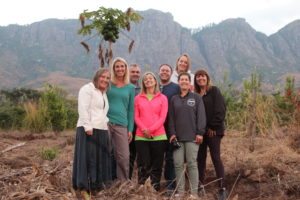 As we were pulling into the farm we found that it was experiencing one of its intermittent blackouts. Malawi relies a great deal on hydroelectric power, and as the river levels drop during the dry season, a trend which has been exacerbated in recent years by lower rainfall due to climate change, less electricity is generated and rolling blackouts are the norm.
As we were pulling into the farm we found that it was experiencing one of its intermittent blackouts. Malawi relies a great deal on hydroelectric power, and as the river levels drop during the dry season, a trend which has been exacerbated in recent years by lower rainfall due to climate change, less electricity is generated and rolling blackouts are the norm.
While this was a slight inconvenience as the newcomers unpacked and settled into their new rooms it was actually a blessing in disguise. When we went down for our first dinner together, we found our dining room lit by candles, which gave the whole dinner a real feeling of intimacy. By the time we finished dinner and had gone through formal introductions, small talk and an overview of the trip and VIP’s mission, the group felt like it was already becoming a team. The next morning after breakfast we were greeted at the farm by all of the Malawian VIP senior staff, the men and women that oversee all of our initiatives and who would be leading us and we worked on various projects together over the next week. After meeting the staff we separated into two teams for our morning assignments, with Randa, Syndey, Susan and Jennie going to work with primary school students and at a CBCC, or community organized preschool, built and supported by VIP.
While they went to work with the children, Jordan, Liz, Jim, my new roommate Tom and I all went with Frank Mwenjemeka, the VIP officer in charge of food security, to work with a farmer who had just decided to embrace conservation agriculture. Conservation agriculture is a form of environmental management which uses low cost, natural strategies to improve soil quality and crop yields. As we rode with Frank to the field where we would be working, he told us how difficult it was for him to convince farmers not to till the land and to cover their land with the remains of last year’s crop, in complete opposition with what farmers in Malawi have been doing for generations. After a discussion of what we the day’s task, Frank began to talk at length about what he has been working on the pasts several years, impressing everyone in the Landcruiser with his soft-spoken knowledge and experience. One of the most interesting things that he talked about was reforestation, and the pressures forests in Malawi faced from the twin forces of democracy and poverty. 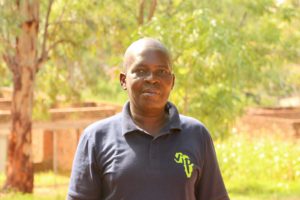
Frank began by telling us that Malawi is one of the most deforested countries in the world. As he spoke he pointed out the Landcruiser windows at the mountains that surround our catchment area and that are a constant presence as we drive through our partner villages. These mountains are stark and almost completely bare of trees, just bare rock shooting skyward, as if the bones of the earth had suddenly erupted through the soil.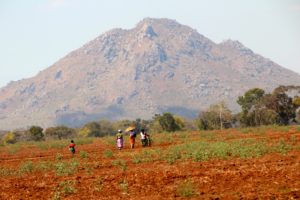 Frank said that less than 30 years ago all of these mountains were green and full of trees. But once President Banda’s dictatorship ended and Malawi became a multi-party democracy with free elections, people no longer voted for politicians who passed laws to protect the forests. Firewood was the cheapest fuel source around for heating and cooking and people began to cut down trees left and right because they simply could not afford anything else.
Frank said that less than 30 years ago all of these mountains were green and full of trees. But once President Banda’s dictatorship ended and Malawi became a multi-party democracy with free elections, people no longer voted for politicians who passed laws to protect the forests. Firewood was the cheapest fuel source around for heating and cooking and people began to cut down trees left and right because they simply could not afford anything else.
Only in the last few years has Malawi finally passed laws protecting the forests and this has led to ugly clashes between would be tree-cutters and soldiers protecting the few remaining forests. All of this deforestation has weakened the lands ability to absorb runoff and prevent erosion, which has led to increased floods, dropping water levels, and declining soil fertility. “But how can we convince people to spend time, effort and water to plant more trees, when they barely have enough time to feed their families?” asked Frank. When no one said anything, he supplied the answer himself; bees. Bees can save the forest.
Frank has worked closely with NJ State Apiarist Tim Schuler the past several years, in fact Frank was wearing a bee-keeping hat that Tim had given him as he spoke to us. People have a hard time making an investment in something that will be a public benefit 10 to 20 years down the road, especially when they are poor, but if they can make money while making that investment, that would completely change their calculus. And that is just what Frank has done. By training farmers to become bee-keepers and selling the honey from the bees to generate extra income, the farmers are also now actively planting trees and protecting existing groves, to ensure that their bees will have homes and food in the forests and continue to produce valuable honey. It was such an elegant solution to two incredibly important issues plaguing Malawi today.
By the time Frank finished talking about the bees and their connection to Malawi’s forests we arrived at the farm. We all got out of the car and introduced ourselves to the farmer we would be working with, who, to his own and Jim’s delight, was named James. We spent the next several hours cutting down vegetation and clearing the land, measuring the plot, digging the holes for the seed and then recovering the land with the cleared brush, which would then slowly decay, putting nutrients back into the ground while protecting the soil and stopping evaporation.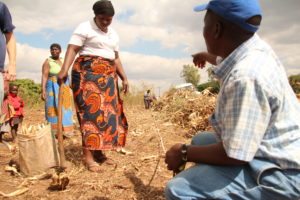 Our team was joined by James and his wife, a “lead farmer” who had embraced conservation agriculture early on and who was now training other farmers on the techniques that had benefited him so much, and at least ten other villagers. The lead farmer was a very smart man. He had been intrigued by what Frank had told him about conservation several years ago, but he wanted to test for himself whether it was true. So he divided his land into two equal parts. On one side he used the conventional tilling and farming practices he had always used, and on the other he used the conservation agriculture techniques that Frank had taught him and waited to see the results. When the side using the conservation ag techniques produced almost double the yield of the conventionally farmed plot he was convinced. And not only was he going to use it, he agreed to become a spokesman and trainer of the techniques, donating his time so that he could help his neighbors benefit from these enhanced techniques.
Our team was joined by James and his wife, a “lead farmer” who had embraced conservation agriculture early on and who was now training other farmers on the techniques that had benefited him so much, and at least ten other villagers. The lead farmer was a very smart man. He had been intrigued by what Frank had told him about conservation several years ago, but he wanted to test for himself whether it was true. So he divided his land into two equal parts. On one side he used the conventional tilling and farming practices he had always used, and on the other he used the conservation agriculture techniques that Frank had taught him and waited to see the results. When the side using the conservation ag techniques produced almost double the yield of the conventionally farmed plot he was convinced. And not only was he going to use it, he agreed to become a spokesman and trainer of the techniques, donating his time so that he could help his neighbors benefit from these enhanced techniques.
The work proceeded smoothly with a lot of singing and laughing, despite a troublesome stump which, ignoring the shaking head that every single Malawian within earshot gave me, I brashly told the group that I could remove in a matter of minutes. Over half an hour later, with bloodied blisters from using the hoes and an ax to try to remove the offensive stump, which was not stronger than ever, I admitted defeat and went to suck on sugarcane with the rest of the group, laughing along with everyone at my own foolishness.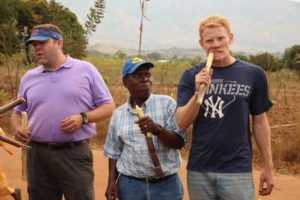
After conservation agriculture it was off to load and unload bricks for the new teacher house being built at the Sakata School, a useful activity which allowed us to ride on the back of a giant truck sitting atop thousands of bricks as we drove from one site to the other.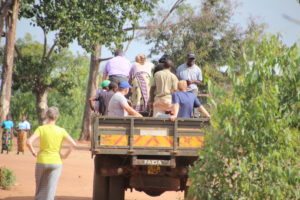 Then we met up with the rest of our team and headed to Mphero Village for a ceremony commemorating the one year anniversary of the drilling of Mphero’s first successful borehole. Mphero was an extremely poor village that had always struggled with finding clean water. The villagers would often draw their water from the Naisi River, which lay beside the village. Less than a mile upstream was Naisi Prison, and every day the prison guards emptied the waste buckets from the prison into the river. As a result of this terribly polluted water, villagers were constantly suffering from diarrhea and many people, especially young children, were dying. That was until the Engineers Without Borders University of Delaware chapter, in partnership with VIP, built a well there last year, which provided the village with a constant, safe supply of water, even at the end of the dry season. We met under the shade of a large tree with the Chief and most of the village as we came back to the village as a team for the first time since the well had gone into operation last August. We listened as the Chief and the villagers thanked us and told us how life in Mphero had changed for the better since the drilling of the well. Diarrhea was gone from the village and no one was dying anymore from lack of the most basic necessity in life, a necessity that we all take for granted every day: clean water.
Then we met up with the rest of our team and headed to Mphero Village for a ceremony commemorating the one year anniversary of the drilling of Mphero’s first successful borehole. Mphero was an extremely poor village that had always struggled with finding clean water. The villagers would often draw their water from the Naisi River, which lay beside the village. Less than a mile upstream was Naisi Prison, and every day the prison guards emptied the waste buckets from the prison into the river. As a result of this terribly polluted water, villagers were constantly suffering from diarrhea and many people, especially young children, were dying. That was until the Engineers Without Borders University of Delaware chapter, in partnership with VIP, built a well there last year, which provided the village with a constant, safe supply of water, even at the end of the dry season. We met under the shade of a large tree with the Chief and most of the village as we came back to the village as a team for the first time since the well had gone into operation last August. We listened as the Chief and the villagers thanked us and told us how life in Mphero had changed for the better since the drilling of the well. Diarrhea was gone from the village and no one was dying anymore from lack of the most basic necessity in life, a necessity that we all take for granted every day: clean water. 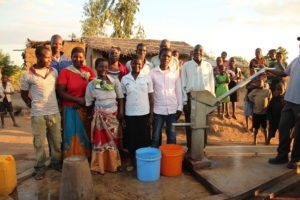
As I sat with Jordan, Isaac Mwalabu, Syndey Chikilema and Tom in the open air bed of a VIP pickup truck, the last of the quickly sinking sun warming our faces, enjoying our Mandazi and sodas that we had picked up on the way home after celebrating with the people of Mphero, I looked up at Zomba Plateau and smiled. Life was good. I was surrounded by laughter and singing, new friends and good food, enjoying the wind whipping through my hair and waving at the people we passed, secure in the knowledge that I was working for an organization that was saving lives every day.


We’re not poor (in money and things) here in the United States, but we don’t do much better when it comes to thinking about the future of the earth.
thank you so much for these posts. i was almost thinking you weren’t going to do anymore when i didn’t see day 5 and then last night saw this. this is my nightly reading. i look forward every day to see what everyone is doing and how things are going. can’t thank you enough Justin for this. can’t wait until night to read more.
Thanks Justin. God is doing great things through the partnership between VIP and the villagers. Keep Randa safe for me.